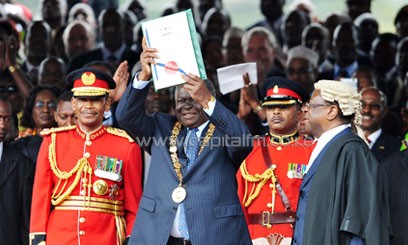Every nation has its transformative moments. But such rarely come without a struggle. It could be war, revolution, rebellion, constitutional change and such disruptive processes.
In its chequered history, Kenya has experienced moments of monumental change. However, three of them stand out as shining examples of the contested nature of national transformation.
The first is Independence in 1963, the culmination of a seven-decade struggle against the oppressive colonial State. The climax was the Mau Mau resistance and political agitation by nationalists between 1952-59 followed by the Lancaster Conferences of 1960-62 leading to Independence.
The second was the return to multipartysm in 1991 with the removal of the infamous Section 2A of the Constitution. This followed sustained civic agitation led by political activists, intellectuals, academics, students and clergy, against the repressive KANU regime.
The third is the adoption of a new Constitution in 2010, the progeny of a two-decade struggle by pro-democracy champions and progressive forces of change. This ushered in a new constitutional architecture hailed as one of the most progressive in modern history.
There have been many other defining moments in the country’s history like the landmark 2002 elections that ended decades of KANU dictatorship.
That too, was the fruit of a relentless push for democratic and constitutional reforms. The Narc revolution, as it was then called, paved way for reforms leading to a new Constitution.
History teaches us that transformative change demands sacrifice, commitment and patriotism on the part of citizens.
In his Madaraka Day speech, President Uhuru Kenyatta pitched for the re-imagining of our nationhood and especially the Kenyan Dream, as espoused by the Nation’s Founding Fathers.
Among other things, he underscored the need to re-engineer the country’s civic culture to one “that is biased toward duty, hard work and integrity.”
Civic culture from a political perspective denotes attitudes, habits and beliefs that inform the functioning of a society or nation.
Political philosophers dating back to Aristotle, Montesquieu, Tocqueville and others have studied civic culture. They all seem to agree that it is a vital component of the political life of a nation and particularly how citizens participate in governance.
Re-creating our civic culture therefore, entails dealing with certain attitudes, habits and beliefs that have progressively become entrenched in our society. These include corruption, laziness, indiscipline, criminality and cynicism.
The nation’s founders desired an independent Kenya free from poverty, disease and hunger. We can include the above as endemic threats facing our country today especially corruption.
Rampant theft of public resources and abuse of power for private gain has become the norm. Recently, an MP was jailed for 67 years and fined Ksh 1 billion for corruption.
A culture of laziness has taken root in our society, where people reject the notion of hard work and instead embrace get-rich-quick schemes, in pursuit of ‘success’.
General disregard for law and other social norms including respect for elders are symptoms of growing indiscipline especially among youth.
Criminality is seen in the escalating cases of fraud committed against the State, individuals and businesses, as well as trade in narcotics, counterfeits, human trafficking, poaching and violent extremism.
Cynicism has led many to believe they are helpless and that it is futile to do the right thing in a society where crime pays.
Transforming our civic culture is the duty of both leaders and ordinary citizens.
Kenya is in dire need of leaders who embody and practise the values that the Founding Fathers exemplified – courage, steadfastness, vision, integrity, selflessness and sacrifice.
Fortunately, Article 10 of the Constitution sets out the national values and principles that will guide us in re-engineering our civic culture. These include transparency, accountability, good governance, patriotism and the rule of law.
Similarly, Chapter 6 of the Constitution establishes a robust framework for rebuilding our civic culture from a leadership perspective. Integrity, selfless service, honesty, discipline and duty are some of the cardinal requirements for State officers.
As citizens, we must be the change we desire. We should elect only men and women of honor, untainted by corruption and criminality. Whining on social media and other forums about inept and corrupt leaders is futile if they are a reflection of who we are. We must also shun negative energy and cynicism fueled by parochial interests.
The circumstances may have changed but the values that inspired the original Kenyan Dream are as relevant today as they were fifty-seven years ago.
The generations that fought for Independence and the Second Liberation of our country delivered their part.
This generation must also rise to the occasion. Our struggle is not as hard as what our predecessors had to endure. Ours is simply about rejecting corruption and embracing a new civic culture driven by positive values like hard work, discipline and integrity.
Mr. Choto is a lawyer and public affairs analyst. kingorichoto@gmail.com

























































